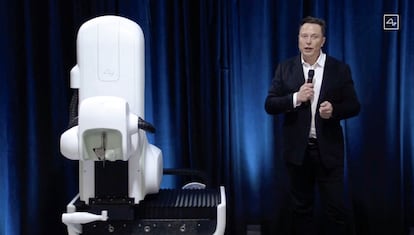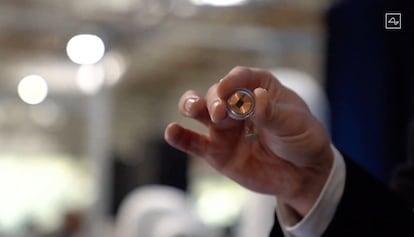Elon Musk’s Neuralink says it has approval to test its brain implants in humans
Founded in 2016, the company sought FDA permission in 2022 but the first application was rejected


Neuralink, Elon Musk’s brain implant company, announced on Thursday that it has received approval by the U.S. Food and Drug Administration (FDA) to carry out its first clinical trial on humans. The controversial businessman had predicted in December that permission from the regulator would arrive during the first half of this year. He was correct, although the approval process was not easy and included a refusal last year.
Neuralink, founded in 2016, said in a statement that this is the first step that “will one day allow our technology to help many people.”
“Recruitment is not yet open for our clinical trial,” added the company on Twitter, promising more information in the coming days.
We are excited to share that we have received the FDA’s approval to launch our first-in-human clinical study!
— Neuralink (@neuralink) May 25, 2023
This is the result of incredible work by the Neuralink team in close collaboration with the FDA and represents an important first step that will one day allow our…
Neuralink has been raising expectations about its products for several years. In 2020, Musk claimed in a presentation that chips made by the company would be able to cure some conditions such as paralysis and insomnia. The entrepreneur, who this week helped Florida governor Ron DeSantis launch his 2024 presidential campaign on Twitter and who is not known for carefully measuring his words, added that Neuralink chips might even give users “superhuman” vision. At the time, the company was showing off the capabilities of its first implants in a pig.
In 2021, Neuralink made one of its most viral presentations. A monkey named Pager sat in front of a television and closely followed what was happening on the screen, a Pong video game. The primate controlled the movements with his eyes alone, thanks to a pair of semiconductors the size of a 25-cent coin implanted in both hemispheres of his brain.

Musk had boasted several times since 2019 that he was seeking FDA approval for human clinical trials. But it was not until 2022 that company officials filed a request with the regulator. According to Reuters, the first application was rejected by the FDA shortly after it was submitted. The agency was reportedly concerned about “the lithium battery of the device, the possibility of the implant’s wires migrating within the brain, and the challenge of safely extracting the device without damaging brain tissue.”
In a special Reuters report from March, several Neuralink employees expressed doubts that Neuralink could quickly correct the issues of concern to the FDA. Kip Ludwig, a former program director for neural engineering at the U.S. National Institutes of Health (NIH), told Reuters that “Neuralink doesn’t appear to have the mindset and experience that’s needed to get this to market anytime soon.”
Neuralink is not the only company preparing to carry out clinical trials on humans. One of its main rivals, Paradromics, is also seeking approval. Founded in 2015, the Austin-based neurotech startup has made leaps and bounds with its implants and has increased its workforce to 50 employees. Its product, called Connexus Direct Data, is described as an assistive communication device for patients who’ve lost the physical ability to speak or type. The promising technology has led the FDA to award Paradromics the Breakthrough Device designation, a program where 32 applications undergo a faster review process, as they could benefit patients in their treatments and diagnoses.
Another company breaking into the nascent brain-computer interface (BCI) industry is Synchron. These companies differ as to the size, weight, and performance of their semiconductors and in the surgical methods for attaching them to the human brain. But they are all equally optimistic about the future benefits they could bring to millions of people.
Sign up for our weekly newsletter to get more English-language news coverage from EL PAÍS USA Edition
Tu suscripción se está usando en otro dispositivo
¿Quieres añadir otro usuario a tu suscripción?
Si continúas leyendo en este dispositivo, no se podrá leer en el otro.
FlechaTu suscripción se está usando en otro dispositivo y solo puedes acceder a EL PAÍS desde un dispositivo a la vez.
Si quieres compartir tu cuenta, cambia tu suscripción a la modalidad Premium, así podrás añadir otro usuario. Cada uno accederá con su propia cuenta de email, lo que os permitirá personalizar vuestra experiencia en EL PAÍS.
¿Tienes una suscripción de empresa? Accede aquí para contratar más cuentas.
En el caso de no saber quién está usando tu cuenta, te recomendamos cambiar tu contraseña aquí.
Si decides continuar compartiendo tu cuenta, este mensaje se mostrará en tu dispositivo y en el de la otra persona que está usando tu cuenta de forma indefinida, afectando a tu experiencia de lectura. Puedes consultar aquí los términos y condiciones de la suscripción digital.








































